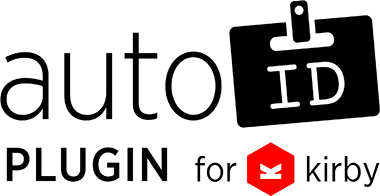AutoID is a plugin for Kirby 2 wich generates unique ids (numeric or hash) for every page.
We love Kirby and its database-less nature. One drawback though is that you don't have unique page ids.
But sometimes this can be very helpful if you need to reference pages to each other or generally need a way to uniquely identify pages other than by name or url (which may change). This is why we developed this plugin.
License: MIT
Add a plugins folder inside your site directory of your kirby installation, if not already existing.
Then download the zip file and copy all its contents into an autoid folder inside the plugins directory. Your folder structure should now look like this:
site/
plugins/
autoid/
autoid.php
...Alternatively, you can add the plugin as a git submodule in order to make future updates of the plugin quick and easy.
$ cd your/project/directory
$ git submodule add https://github.com/helllicht/kirby-autoid.git site/plugins/autoidIn your blueprint, add a new field and use autoid as the field name. This way the plugin knows on which field to act on. As field type set autoid to use the custom AutoID field which comes with the plugin.
fields:
autoid:
type: autoidRecommended Configuration
Now, the plugin creates a unique id for each new page created, which is stored inside the field. It also works with existing pages, all you need to do is to open the page in the panel and hit save once.
Let's say you want to have a field that allows you to add related projects to a project page. Normally you would query each sibling and reference them by their name/url/uid. But what if they names change? You would need to update each reference individually.
AutoIDs to the rescue! You can use the autoid field to uniquely reference the projects. This way even if the project names/urls change, the references won't break.
fields:
relatedprojects:
label: Related Projects
type: checkboxes
options: query
query:
fetch: siblings
value: '{{autoid}}'
text: '{{title}}'Maybe you need to create an autoId within your code itself, for example if you are importing content or you want to create an autoId for existing content. Then you have access to the now public method getUniqueAutoId() after instantiating the AutoIdPluginclass, too.
$autoId = new AutoIdPlugin('autoid', c::get('autoid.type', 'id'));
return $autoId->getUniqueAutoId();
Example programmatic usage
Some of you might want to have a custom name for your autoid field. You can override the name inside the site/config.php file of your Kirby installation.
c::set('autoid.name', 'yourcustomfieldname');This allows you to use yourcustomfieldname as the field name for your autoid field.
By default, AutoID now uses unique md5 hashes (microtimestamp + session id) to make sure each ID is unique. This is our recommended method.
However, for those of you who don't want unreadable hashes and prefer more readable numeric ids, AutoID offers this method as well. You can set it in your config.
Please note: This method is only recommended if you're the only contributor to the project. If you're working in a larger team working in parallel in local repositories, you might run into problems using numeric ids as pages will end up getting the same ids.
c::set('autoid.type', 'hash');This will also work when switching back and forth between the regular numeric id and the hashes. Please note that your existing ids won't change, so you might end up having both numeric and hashed ids.
Do you have feature suggestions or want to help improving the plugin? Feel free to contribute!
#madebyhelllicht with ♥ in Groß-Gerau

